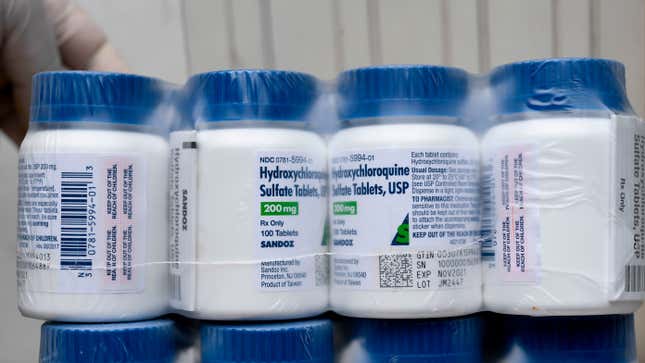
A new study is the latest to suggest that hydroxychloroquine isn’t an effective weapon against covid-19, even when taken as a preventative drug. The randomized, double-blinded trial found no difference in the risk of catching covid-19 among health care workers who either took the malaria drug or a placebo before they were potentially exposed to the virus.
The study, published in JAMA Internal Medicine, involved 125 health care workers who were randomized to receive either 600 milligrams a day of hydroxychloroquine or a placebo, for a period of eight weeks. All had tested negative for the coronavirus that causes covid-19 prior to the study. They were periodically tested for infection once the trial began, most at the four- and eight-week marks.
Overall, 6.3 percent of the hydroxychloroquine group was confirmed to have a positive test for the coronavirus during the trial, compared to 6.6 percent of the placebo group. These infections were all mild or asymptomatic, with no noticeable differences between the groups. The results were so compellingly null that an independent board chose to end the trial early, after most but not all of the recruited volunteers had taken the full eight-week course of treatment (200 volunteers were supposed to take part). Though it’s possible that letting the study completely wrap up might have changed the findings, it’s pretty unlikely—of the 125 participants included in the study’s analysis, only 22 stopped treatment early.
“As such, we cannot recommend the routine use of hydroxychloroquine among health care workers to prevent COVID-19,” the authors wrote.
This isn’t the first randomized clinical trial to cast doubt on hydroxychloroquine as a prophylactic for covid-19. In June, a study in the New England Journal of Medicine similarly found no difference in infection rates among over 800 people who were known to have been recently exposed to someone with confirmed covid-19 at their home or workplace.
However, that study was looking at the potential of hydroxychloroquine as a post-exposure prophylactic, similar to how people can receive the rabies vaccine to prevent illness after a bite from a rabid animal. These latest findings, on the other hand, are the first published evidence from a clinical trial testing the drug out as a pre-exposure defense, according to the authors.
An observational study—meaning research that simply observed what happened to people rather than assigning them to receive a drug or a placebo—published in the Lancet last week found that patients already taking hydroxychloroquine for chronic inflammatory conditions like rheumatoid arthritis or lupus weren’t any less likely to catch covid-19 than people not taking the drug.
David Boulware, an infectious diseases doctor at the University of Minnesota and lead author of the June NEJM paper, told Gizmodo that the small sample size of the JAMA trial makes it hard to draw any solid conclusions. But Boulware notes that he’s the co-author of a similar but still unpublished study of over 1,400 health care workers that also found no effect for hydroxychloroquine as a pre-exposure prophylaxis (the paper is undergoing peer review, Boulware said).
A small segment of people and some scientists continue to swear by the drug’s curative and protective effects for covid-19. This week, for instance, a preliminary paper was released on the website medRxiv that conducted a meta-analysis of three clinical trials of prophylactic hydroxychloroquine and claimed to find a modest protective effect for the drug. However, all of the trials individually found no significant effect for the drug.
Boulware, who is a co-author on two of the trials included in the meta-analysis, believes that it could have better accounted for strange quirks in the data. One example is that people in his trial who were assigned to take hydroxychloroquine but never actually did were shown to have better outcomes than any other group. That’s likely just a random statistical fluke, but it further suggests that hydroxychloroquine isn’t having any real effect on the progression of illness in people with covid-19, good or bad. Of course, he adds, more data is needed for any definitive answer.
Is it possible that hydroxychloroquine could still be a valuable tool in the fight against covid-19? Well, proving a negative is always very hard in science. But when you look at the most carefully controlled studies of hydroxychloroquine so far—namely large, randomized, and double-blinded clinical trials—the drug has fallen short. Boulware noted that there is at least one large clinical trial of preventative hydroxychloroquine still underway, the Duke University-led HERO trial, with results expected to emerge in the next month or two.
The results of the HERO trial could very well turn out to be a positive for hydroxychloroquine. But right now, when the evidence for a therapy is this muddled, it’s more likely than not that the drug just isn’t very useful in the first place. In the midst of a still-raging pandemic threatening to cause new waves of infection in the U.S. and elsewhere, it seems like a waste of everyone’s time to continue hoping that hydroxychloroquine will somehow turn into the game-changer that it was once promised to be.